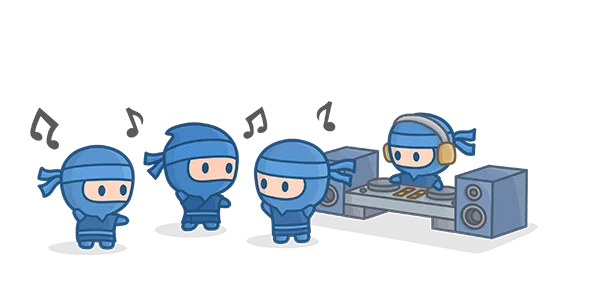
Exploring for Experiences
Dominant Aspects
If humans were computers, our dominant traits would be the operating system that is embedded and hard-coded in our minds. These deeply ingrained behaviors run on autopilot, driving our every action without conscious thought. Like breathing or blinking, we can actively choose to control our actions with enough concentration. However, most of the time, our recurring behaviors seem to be driven by our subconscious, functioning effortlessly and instinctively.
Instinct is a marvelous thing. It can
neither be explained nor ignored.
Agatha Christie
Dominant traits are often mistaken as strengths in most other personality systems. But here in Personality Ninja, we hold a different view. To us, traits are just traits, shaped by the wiring of our cognitive functions. Whether a trait is good or bad largely depends on the way it is used. As such, these traits can either be the source of one's greatest strengths, or the cause of their biggest downfall.
Naturally, we will hone our dominant traits, refining them into our super strengths. However, if we are not careful, there is a chance that we may push our dominant traits into overdrive, manifesting them in very unhealthy ways. In the end, our dominant traits are our natural tendencies and nothing more. The key to harnessing them effectively lies in knowing when, where, and how to use them.
Collaborators are the kindest souls anyone would ever come across. Having a big heart for others, they only want the best for everyone around them. Collaborators never miss an opportunity to lend a helping hand as they are always on the lookout for those in need. Kindness spreads wherever they go, inspiring those they have touched to make an impact on others. After all, any act of goodwill no matter how small adds up to a better and brighter world.

Collaborators usually fear letting people down, some more than others, gradually turning the act of helping into a toxic addiction for validation. They work tirelessly to meet everyone's demands for fear
of judgment. Driven by insecurity, Collaborators subconsciously act based on people's perceptions instead of their own accord, losing sight of their selfless intentions. In truth, Collaborators aren't helping anyone if it is all done for the wrong reasons.
Caught in an endless loop of service, Collaborators often spread themselves too thin, taking on more than they can bear. They might neglect themselves to satisfy expectations, never once placing their own needs above others. Over time, Collaborators who overwork themselves are left teetering on the brink of burnout. All it takes is a hint of pressure to send them falling into a downward spiral, unable
to help anyone else because they neglected to prioritize themselves.
When conflicts arise unexpectedly, Collaborators are quick to smoothen things out. Often, problems stay stagnant because everybody wants their voices heard, but no one bothers to listen. Therefore, Collaborators gauge people's words and feelings to understand a situation better before jumping right in to clear things up. Aware of everyone's concerns, Collaborators ensure that everyone feels heard to bring any conflict to resolution.

However, Collaborators may be extra careful with their words, not wanting to hurt anyone's feelings. They might sugar-coat sensitive details and avoid making harsh comments to preserve the group's harmony. But by doing so, they are merely sweeping problems under the rug, allowing the issues to persist. If they wish to overcome this, Collaborators must learn to be straightfoward, or the same problems will only resurface over and over again.
In hopes of remaining neutral on issues, Collaborators risk not having a stance at all. They might simply agree with others regardless of their own beliefs, just to get in everyone's good graces. Because of that, they end up blindly following the consensus, losing their own sense of right and wrong. If this continues, people will eventually realize that Collaborators are merely fakes, saying whatever to please those around them at the current moment.
Collaborators aspire to be popular and admired among people. Striving to get to the top, they are motivated to attain success in the real world: wealth, power, and prestige. When they set out to achieve, they never settle for less. Hence, Collaborators often strive for the best experiences and the coolest ventures that life has to offer. Naturally, Collaborators will be regarded as high-achievers, earning them immense respect from the people they inspire.

Striving for success takes a turn for the worse when Collaborators act on their impulses around others. Filled with a desire to impress, all it takes is a little push for them to perform risky ventures without thinking twice. The adrenaline rush feels good, but the enthusiastic admiration that comes after feels even better. Unfortunately, doing so might not be worth it because Collaborators are potentially harming themselves in exchange for mere likes and validation.
Success without a purpose will only lead Collaborators straight to their downfall. It may dawn on them that striving for superficial success—status symbols and grand titles—only brings emptiness and suffering. The validation gained from shallow pursuits wind-up meaningless without a purpose. If Collaborators want to attain success that fulfills their souls, they have to look beyond the materialistic world, uncovering deeper meaning behind their future pursuit of success.
Life is a grand adventure waiting to be explored. Whenever thrilling opportunites with others arise, Collaborators are excited to dive right in. While Collaborators are at it, they radiate an aura of charisma and enthusiasm, inspiring others to be passionate and to strive for more. With Collaborators around, no activities are ever dull because they can transform anything into exciting ventures.

However, Collaborators might occasionally let their spontaneous nature get the better of them. Being stirred up by anything and everything, they are easily distracted from the goals their teams have set out for. Having no clear direction, Collaborators follow the path that brings the most thrill, leading the team away from the road to success. Although enthusiasm is undoubtedly crucial, if left unchecked, will only cause the team to lose out more in the end.
Filled with excessive energy, some Collaborators may go over the top when things get overly exciting. In their minds, they think they are behaving normally, but in the eyes of others, they are disturbingly loud and obnoxious. When Collaborators behave recklessly, it only places them in a negative spotlight. Before long, their enthusiasm degrades into annoyance, damaging their reputation beyond repair.
To wrap it up, dominant traits are neither our strengths nor are they our weaknesses. They are simply traits we tend to exhibit naturally in our daily lives without much realization.
The biggest reminder here is this: a trait is a trait. It is a unique characteristic of an archetype, each carrying its own pros and cons. With that understanding, let us now venture into the next set of traits that we do more consciously—our supportive traits.
Read next section →
Supportive Traits [Collaborator]